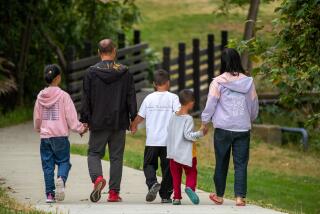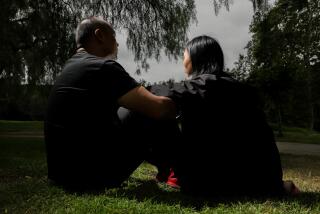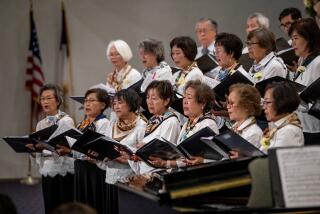Migrants’ Quest to Stay Adds to Tensions in Hong Kong
- Share via
HONG KONG — The attack was over in minutes, but its impact is certain to last.
Angered and emotionally exhausted by years of wrangling with officialdom, about 30 young mainland Chinese immigrants fighting to join family members in China’s newest, wealthiest city simply snapped. They sprinkled flammable liquid along the corridors of the 13th-floor offices of Hong Kong’s Immigration Department. They doused themselves.
Then they lighted a match.
The resulting wall of flame seriously burned 50 people, two of whom later died--a 42-year-old immigration officer who tried to shield his colleagues from the fire and a 26-year-old immigrant who allegedly had helped plan the attack.
But beyond the personal toll, the incident last month was a disturbing setback for Hong Kong, reviving doubts about its commitment to the rule of law and widening an already huge cultural divide between the territory’s 6.7 million residents and mainlanders from the vast hinterland of southern China.
The incident also refocuses attention on the emotional questions of who has the right to live in Hong Kong and which authorities--those in Beijing or Hong Kong--have the right to decide.
Collectively, these issues cut to the heart of Hong Kong’s future--all at an especially delicate time for its leaders as they work to define Hong Kong’s identity three years after the former British colony returned to Chinese sovereignty.
As a leading global financial center, a gateway to China’s huge markets and home to $21 billion in direct U.S. capital investment, America has a sizable interest in Hong Kong’s success.
Last year, Hong Kong Chief Executive Tung Chee-hwa unsettled many observers by seeking Beijing’s help in overturning a Hong Kong appeals court ruling that gave a liberal interpretation to the territory’s residency requirements. Rejecting accusations that the move would endanger Hong Kong’s freedom, he insisted that his government had been forced to act to prevent a flood of up to 1.6 million mainlanders from overwhelming the territory and its way of life.
“What we are faced with now is a big gap between humanitarian ideals and the sad reality,” Regina Ip, Hong Kong’s secretary for security, said in an interview.
Government opponents, however, dismiss the 1.6 million figure as fiction. They see it as part of a government scare campaign to buttress its position; the real figure, they say, is about 200,000--a number that they contend Hong Kong can easily absorb.
Independent Judiciary Seen as Threatened
But as legal challenges by immigrant groups move through Hong Kong’s courts and public attitudes toward immigrants harden further, worries grow about the possible erosion of a cornerstone of Hong Kong’s democracy: its independent judiciary.
Many fear that damage has already been done. They point both to a series of lower court rulings in recent months that have gone against immigrant groups and the stepped-up pace of the rulings themselves as evidence.
Martin Lee, the leader of the opposition Democratic Party, said: “Most judges are very conservative, and some of them will be saying, ‘I don’t agree with the government’s interpretation, but if I rule against, I’ll just be taken to Beijing and corrected, so why create a constitutional crisis to no avail?’ ”
When combined with other recent problems, such as allegations last month that Tung tried to silence a university professor who had conducted polls whose results were unfavorable to the government, and the controversial manner in which Hong Kong entrepreneur Richard Li managed to acquire controlling interest in the telecommunications giant Cable & Wireless HKT Ltd., Hong Kong’s international image has not had a good year.
“Taken individually, none of them would be enough for a [foreign] executive to lose sleep over, but collectively they are a matter of concern,” said Frank Martin, president of the U.S. Chamber of Commerce in Hong Kong.
Some observers fear other consequences for Hong Kong.
They note, for example, that the arson attack prompted a strong backlash--in the form of heightened anti-immigrant sentiments--that could further broaden an already huge cultural gap between Chinese mainlanders and residents of Hong Kong. It is a gap that many believe will hamper the successful economic integration of Hong Kong with the mainland--an integration viewed as vital to the former colony’s long-term viability.
“Both [the southern mainland province of] Guangdong and Hong Kong are working on long-term transportation projects to integrate Hong Kong with China, but mentally, culturally and politically, it isn’t happening,” said Michael DeGolyer, an American academic who monitors public attitudes here in Hong Kong. “If Hong Kong doesn’t accept a relationship with the mainland, it’s going to be increasingly disadvantaged.”
Fu Ka-wai, a no-nonsense, twentysomething spokeswoman for one immigrant group, attests to the heightened emotions after the attack. She describes how, as she chatted with friends on the subway one recent evening, a passenger who overheard their mainland accents suddenly began cursing the group before declaring, “You are the murderers.”
“I didn’t know what to do,” Fu said. “I tried to smile.”
With Hong Kong’s Westernized, democratic lifestyle and annual per capita GDP of more than $23,000, its attraction for those from the far poorer mainland would be strong enough in itself to create immigration problems. But the fact that most disputed cases involve children of Hong Kong residents seeking family reunification adds an emotional dimension to the problem rarely seen elsewhere.
“Who are these people, after all?” opposition leader Lee asked rhetorically. “They are our kids.”
Court Ruling Reversal Leads to Uncertainty
Fu is just one example. She came to Hong Kong from southern China’s Fujian province in February 1999 to join her parents and younger brother only a few weeks after Hong Kong’s highest court issued its liberal ruling. It declared that children who were born before their parents became Hong Kong residents also had the right to claim residence.
It was a decision that appeared to include her.
The Hong Kong government had fought the case--and lost--arguing for a narrower interpretation, one that required at least one parent to have been a Hong Kong resident at the time of a child’s birth. When Tung’s government successfully enlisted Beijing’s support to reverse the appeals court five months later, Fu suddenly found herself back on the outside.
Today, she is one of an estimated 10,000 mainland immigrants in Hong Kong seeking permanent residence and one of 5,300 listed as plaintiffs in the latest major legal challenge to the government’s narrow interpretation. A lower court ruled against them June 30, and an appeal is scheduled to be heard in October.
Sui-sing Lam, the immigrant who died in the arson attack, also was among the plaintiffs. Acquaintances say he was despondent after the legal defeat in June, and human rights advocates working with the immigrants say his mood reflects a larger desperation, with some talking openly of suicide if their cases aren’t resolved quickly and favorably.
The attack “was a desperate act by desperate people,” said Father Franco Mella, a Roman Catholic priest who works with mainland immigrants and fasted for four days after the deaths to protest the attack and what he called “the larger violence of a government that divides families for years.”
In the aftermath of the Immigration Department attack, all sides have pledged to cool the atmosphere, to talk to each other and accelerate the decision-making process. Government officials say they hope that the remaining cases will be completed by February.
Beyond that, however, there seems to be little agreement. An initial meeting between government and immigrant representatives late last month ended inconclusively.
Security Secretary Ip insists that there will be no change in policy.
“All they want is to be allowed to stay, but it’s really impossible,” she said. “People who look at this from a humanitarian angle, they don’t understand. If you give these people amnesty, you’ll be creating a greater pull factor, causing a lot of others to come in to try their luck.”
She says the only fair solution is for all immigrants to return to the mainland and apply under a quota system that allows entry to about 54,000 people a year. Half the quota, she says, is set aside for family reunification cases. She acknowledges, however, that someone such as Fu might have to wait as long as 20 years.
“In the meantime, the door is open for visits,” she said. “There’s no Iron Curtain here.”
Despite such talk, Mella says he believes that the immigrants will eventually win.
“This is basically a human rights problem, and history tells us if human rights are not respected, at some time there will be a victory for the aggrieved people,” he said. “That’s what happened in South Africa and India. That’s what will happen here too.”
More to Read
Sign up for Essential California
The most important California stories and recommendations in your inbox every morning.
You may occasionally receive promotional content from the Los Angeles Times.













